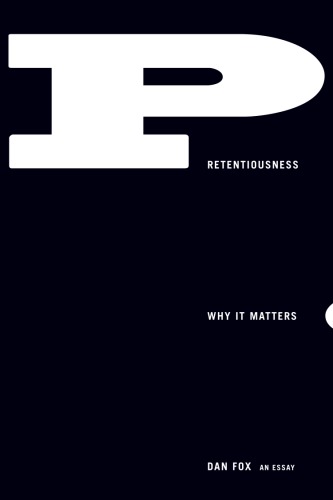
Pretentiousness
Why It Matters: An Essay
کتاب های مرتبط
- اطلاعات
- نقد و بررسی
- دیدگاه کاربران
نقد و بررسی

January 4, 2016
In a stirring defense, British art critic Fox delves into the etymology and history of pretentiousness. Class identity, Fox argues, is at the core of pretentiousness. When pretentious is used as an insult, it’s mainly “an informal tool of class surveillance,” or maybe just a way to call out those above one’s own station. Unlike its common synonyms, pompousness and self-importance, pretentiousness, it turns out, is linked directly to the theater and acting. Fox makes clear how certain types of performances and acts are interwoven in the masks or selves that people adopt in everyday life. He argues that the subtleties of who or what gets labeled pretentious pervade our modern lives, and often those who are called pretentious simply “brave being different” in the world by taking “a stand against creative consensus.” He explains how his own middle-class upbringing in Oxfordshire left him with the feeling that pretension was something positive. His book stands as a convincing philosophical investigation into a wide-ranging concept that governs much of the way people behave.

January 15, 2016
A short book puts a positive spin on a term of almost universal disparagement. As British musician, editor, and filmmaker Fox notes, "pretentiousness" is rarely cast in a positive light, so he attempts to offer a corrective, claiming "it is the engine oil of culture; every creative motor needs it in order to keep running and not seize up and corrode with complacency." Furthermore, he writes, "pretentiousness keeps life interesting." Fox shows how the term is applied widely and vaguely to cover a multitude of sins, and wary readers will be careful about employing the word again. Yet the positivity in which he recasts the stigma requires a reframing of the argument. He pits pretentiousness against authenticity, which is sort of a straw man, since it's easy to show how so much authenticity is actually a stylistic affectation, an illusory return to false innocence and simplicity. So if authenticity itself is so often inauthentic (think Ralph Lauren), how do we distinguish the offending qualities in pretentiousness? "Pretentiousness shares with sophistication a lingering sense of 'unnaturalness'; something faked, pretending, tampered with," writes the author. But it also suggests someone smug, elitist, and humorless, at least in America, where Fox now lives. (He recognizes that a British accent might sound pretentious to some Americans.) Thus, among the examples of pretentiousness Fox celebrates are the likes of David Bowie and Brian Eno, who have too much fun with ideas and identities to be truly pretentious. He comes at rock (and comes at it often) from a British art school context, which is different from the American rock that so profoundly influenced the Brits who sold it back to America. Much of what Fox ardently defends as pretentious doesn't seem too pretentious at all, though it's hard to dispute a central insight: "Pretentiousness is always someone else's crime. It's never a felony in the first person." Not as provocative as it might be, but never pretentious.
COPYRIGHT(2016) Kirkus Reviews, ALL RIGHTS RESERVED.

























دیدگاه کاربران